Cheryl Reavis's Blog, page 8
December 25, 2013
Kindle For Christmas? Classic Romances by Award-wining Author Cheryl Reavis...
(Writing as "Cinda Richards")
Fill your new Kindle with these Classic Romances: (Please be advised that these romances are rated "PG.")
CLICK ON THE DESCRIPTION OF THE HERO.
The Scotsman:

The Marine:

The Cowboy:

The Other Cowboy:

The Cop:

Fill your new Kindle with these Classic Romances: (Please be advised that these romances are rated "PG.")
CLICK ON THE DESCRIPTION OF THE HERO.
The Scotsman:

The Marine:

The Cowboy:

The Other Cowboy:

The Cop:

Published on December 25, 2013 12:57
December 23, 2013
Writing (About) Life--Reprising the Family Christmas Eve Eve Story...

As I've said before, on Christmas Eve Eve I always remember our family's "Almost Christmas Stranger." And, in keeping with that, once again I'm going to post an excerpt from one of my newsletters about it--a re-re-post, if you will. The memory is especially strong this year, because the weather is much the same as it was the night she suddenly appeared on our doorstep. Dreary. Off and on rain. Such a long time ago, and I'm still wondering what happened to her.
(Oh, and the excerpt also includes my late sister-in-law's wonderful Lemon Fruit Cake recipe.)
--------------------------------------------------------------------------------------------------
Today -- since it's beginning to look a lot like Christmas around here -- I thought I'd post an excerpt from a past newsletter about a long ago, sort of Christmas Stranger incident and the person my mother and I always make a point to remember this time of year. I'm also going to re-share my late sister-in-law's recipe for lemon fruit cake. She made one every Christmas, and like all of her holiday baking, it was wonderful. (Don't let the words "fruit" and "cake" scare you.)
But first, the excerpt:
"...She was my family's slightly early Christmas Stranger. She arrived on our doorstep on Christmas Eve eve many years ago, and my mother and I can no longer remember her name. It was cold and dark. My mother was sewing my angel robe for the Christmas pageant, and my little sister was a baby. The pounding on our front door was so abrupt and urgent that I was afraid for my father to open it, and even more afraid of the young girl who ducked under his arm and rushed inside when he did. She was barefoot -- and clearly in distress.
She lived in Charlotte, she was eventually able to say, and she was on her way to a party her father had forbidden her to attend, something she regretted even before the party-goers had become too drunk to drive and had lost control of the car they were in and ended up in a ditch. They managed to get the car out, but they had driven off and left her there in the dark.
She had no money. No way home. No shoes. My mother searched her closet to find some shoes for her -- gray suede penny loafers that were a couple of sizes too big. Getting her home was a little more difficult. We all piled into the car and took her to the bus station in nearby Salisbury. I remember how strange I felt, wearing my winter coat over my flannel, nursery-rhyme print nightgown. I didn't get to go to town at night very often, and at that time of year it was dazzling with Christmas lights, the kind you don't see anymore. Everything was so beautiful -- a real treat despite the strange young girl in the car who was still trying not to cry.
My father bought her a bus ticket to Charlotte -- which literally took all the money he had -- and he insisted that we would wait with her and make sure she got onto the bus all right. It seemed to take forever for the bus to arrive, but eventually it came. She got on it, and that was that. We never saw her again, never heard from her. But I always think of her this time of year and wonder what happened to her and whether she ever thinks of us in return...."
-----------------------------------------------------
GAZIE'S LEMON FRUIT CAKE
1 pound butter
6 eggs at room temperature
2 and 1/3 cups of sugar
3 ounces of pure lemon extract ("pure" is underlined twice so I'm guessing it matters)
4 cups all-purpose flour, sifted
1 and 1/2 t. baking powder
1/2 t. salt
1/2 pound candied cherries (red)
1/4 pound candied cherries (green)
1/4 pound candied pineapple, diced
1/4 pound white raisins
4 cups of chopped nuts
Lightly flour fruit and nuts with a couple of tablespoons of additional flour.
Set aside.
Cream butter and sugar.
Add eggs one at a time and beat well.
Add lemon extract and beat well.
Mix dry ingredients together.
Beat it into creamed mix a little at a time.
Fold in candied fruit and nuts.
Pour into 10" greased and floured tube pan.
Bake at 300 degrees for 1 and 1/2 to 2 hours or until cake tests done.
Published on December 23, 2013 07:55
December 14, 2013
Writing (About) Life--Christmas, Christmas Time Is Here...
Christmas in the Foyer 2013--which looks a lot like Christmas in the Foyer 2012.
And 2011, come to think of it.

And Christmas in the Den--Lights on the tree and not much else. But..

The bubble lights are bubbling. (Love bubble lights.)

Published on December 14, 2013 08:26
November 27, 2013
Happy Thanksgiving
I'm wishing you a Charlie Brown kind of Thanksgiving, where it is all about the company.Family.Friends.Love.

Published on November 27, 2013 20:28
November 24, 2013
Writing (About) Life--Meteor? "Meteor-ish? or...What Is It?
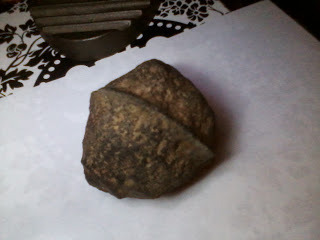
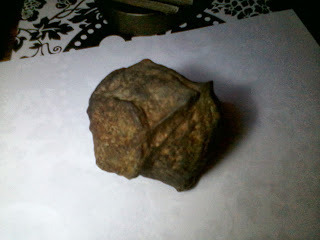
My son texted me this morning, asking if I'd find the odd rock he'd found in a creek near the house when he was a boy, take pictures of it and send them to him. Oh, sure. Why not? So I found the rock. I took the pictures. I sent them to him. And I thought I'd show them to you, while I was at it. All I know about it is that he found it in the creek, it has several flattened "facets" on the surface, it's not magnetic, and it's noticeably heavy for its size.
What do you think it is?
Published on November 24, 2013 08:47
November 22, 2013
Writing (About) Life: 50 Years Ago Today...
Like most people who were around when President Kennedy was assassinated, I remember where I was. I'd been in the operating room doing my student nurse thing since 6:45 that morning, scrubbed in and sterile, passing instruments, threading curved suture needles with cotton suture, suctioning,retracting, retracting, retracting some more. The muscles in my arms were still "trembly" from keeping the wound open wide enough for the surgeon to see whatever he needed to see. The smell of "surgery" was in my nose despite wearing a mask (yes, surgery has a smell), and I was walking back to the nurses residence, specifically to the ground floor classrooms for afternoon classes, so glad to be out in the fresh air, albeit briefly. When I opened the back door of the residence, the school secretary came running down the hallway toward me. Her hair was very long and oily and full of dandruff because she rarely, if ever, washed it. I remember thinking that it didn't fly out behind her as one might expect when a person is at a full run. And then she was saying the same four words. "The president's been shot! The president's been shot!." I have no memory of what happened after that, where I went or what I did. Were classes cancelled? I don't know. It's all blank now. I do know I went home for the weekend, because I was sitting on the arm of the couch in my mom's living room watching live television when Jack Ruby shot Lee Harvey Oswald. (Why do we always refer to him by all three of his names, I wonder? Because of John Wilkes Booth?) And my next memory is of the funeral procession, everybody walking, a little boy saluting--which seemed so staged and out of place to me because he was only just three--and the drums, and the high strung skittish horse. Such a long time ago. The images fade from my mind, but not the emotion.
Published on November 22, 2013 10:58
October 24, 2013
Writing (About) Life: Old Family Photos
I keep forgetting that the DH's parents were the age of my grandparents--the DH was born when his mother was well into her 40s.
So I'm often taken aback when I find some of their old photos, like the one below. I told the DH that I'd found a picture of his dad when he was young and looking like one more mean motor scooter (slang for a "bad boy" when I was in high school.) (Yes, there were high schools back then--I didn't realize there was some question about that until one of the Grands asked me about it.)
ANYWAY. This is a photo of Raymond Lafayette Reavis in his youth, husband of Rose, father of Rachel Lucille, Gazelle, and Richard Wayne. He served in World War I (as did my grandfather). At one point, he became a policeman, and he was the only officer on the force who could (or perhaps would) go into the mill villages to keep the peace when All Heck broke loose on Saturday nights.
He worked the 3rd Watch, and when he got off work in the mornings, he often liked to put the older kids in the car and just drive to no place in particular, picking backroads at random just to see where they went. My late sister-in-law told me once that she loved doing this and was never worried about his getting them lost--unlike one of Raymond's brothers-in-law who had a really difficult time with the impromptu nature of one of these jaunts--his first and his last, I believe.
Raymond died young--when the DH was two--of complications from diabetes. The collar on his shirt makes me think that the photo might have been taken circa 1920s. In any event, it would appear that he's got his game face on. He looks like somebody who'd go fearlessly into the mill villages and settle things down, doesn't he?
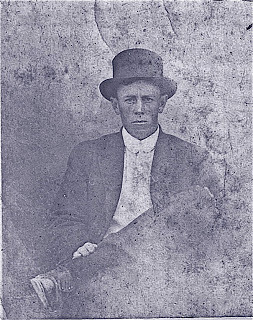
So I'm often taken aback when I find some of their old photos, like the one below. I told the DH that I'd found a picture of his dad when he was young and looking like one more mean motor scooter (slang for a "bad boy" when I was in high school.) (Yes, there were high schools back then--I didn't realize there was some question about that until one of the Grands asked me about it.)
ANYWAY. This is a photo of Raymond Lafayette Reavis in his youth, husband of Rose, father of Rachel Lucille, Gazelle, and Richard Wayne. He served in World War I (as did my grandfather). At one point, he became a policeman, and he was the only officer on the force who could (or perhaps would) go into the mill villages to keep the peace when All Heck broke loose on Saturday nights.
He worked the 3rd Watch, and when he got off work in the mornings, he often liked to put the older kids in the car and just drive to no place in particular, picking backroads at random just to see where they went. My late sister-in-law told me once that she loved doing this and was never worried about his getting them lost--unlike one of Raymond's brothers-in-law who had a really difficult time with the impromptu nature of one of these jaunts--his first and his last, I believe.
Raymond died young--when the DH was two--of complications from diabetes. The collar on his shirt makes me think that the photo might have been taken circa 1920s. In any event, it would appear that he's got his game face on. He looks like somebody who'd go fearlessly into the mill villages and settle things down, doesn't he?

Published on October 24, 2013 10:04
September 13, 2013
(The) Writing Life--Pesky Prologues or...
...Select All, Delete.
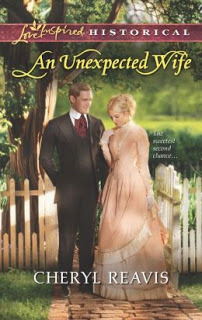
Do you like prologues? I like prologues. I freely admit, though, that many times they are more for me than for the reader. They help me "anchor" my sometimes misty idea of how we got to where the book begins. (I have a hard time "springing from the Head of Zeus.") And this may be why I will have had difficulty getting prologues past editors.
In any event, the latest prologue to end up in the iMac "Trash" was this one from AN UNEXPECTED WIFE .
I was hoping you might like to read it. I'd also like to know what you think:
PROLOGUE 1857
She kept her face turned away from the other women in the room, her body trembling with exhaustion and pain. The windows were open. A cool breeze from an approaching thunderstorm swept over her, making the trembling worse. She could hear a murmur of voices—lilting Italian voices—and occasional laughter coming from the gardens below as the grounds keepers hurried to finish their work ahead of the storm. When she’d first arrived, she’d thought this place was a church because of the manicured lawns and the tall bell tower. And so it was—in a way. It had once been a nunnery, a house of piety for the faithful as well as a refuge for the ostracized and disappointed—women who had been forced to hide themselves away and thus save their families from an otherwise unavoidable scandal. For all intents and purposes it was still that.
She could see flashes of lightning illuminating the room from time to time and hear the ensuing rumble of thunder, but the thunder wasn’t loud enough yet. She wanted—needed—it to be loud. She didn’t want to know what the women were doing, didn’t want to hear the soft mewling cry of the child she had just borne. A girl? A boy? She hadn’t asked, and no one was likely to tell her.
She didn’t know where her mother had gone. She supposed that it was better for them both that the midwife had banished her from the final ordeal of her only daughter’s accouchement. What a poetic-sounding word for her situation, she thought. French. There had been a time when she had loved studying the French language. She had worked hard to learn and understand it, almost as hard as she had worked not to understand the Italian spoken around her now. She was far too ashamed to wonder what the attendants and servants said about her.
She closed her eyes, trying not to think of the vast sum of money it must have cost her father—and perhaps John’s as well—to send her here. She still didn’t know quite where she was despite the months that had passed. Italy, of course. Pesaro. But was it the town or the province? All she had been able to glean by eavesdropping on her parents’ conversations was that the former nunnery was run by a woman of great means who had once found herself in a similar situation and who now profited from the experience by offering a discreet haven for wealthy young women until an ill-gotten child could be born and conveniently removed from their otherwise impeccable lives.
She wondered how her father had come to know about this place, just as she wondered if John even knew she was here and if he had agreed to the plans made for their child. She doubted it. Her family honor was more at stake than his. He would have had even less influence regarding what was to be done than she had. It was likely that he was back at school now, his life unchanged, while hers…
A tear slid from beneath her tightly closed eyelids, and then another and another.
“Bambina povera,” the midwife said, reaching out to touch her on the shoulder and making her jump. She hadn’t realized the woman was so close. She turned her head sharply to see the opposite corner of the room where the other women still clustered, because she had understood the words despite her best efforts.
Poor little girl…
But nothing seemed to be amiss among the other women, and she suddenly realized that the midwife had meant her.
Poor little girl…
She began to cry in earnest then, sobbing loudly despite all she could do.
The woman made no effort to dissuade her from weeping. Instead, she brought towels, a basin, an ewer of warm water and some herbal-scented soap to the bedside. Silently, she began the long process of washing the ordeal of giving birth away, working slowly and methodically, despite the tears and protests, until the job was done and she had been forced to feel better whether she wanted to or not.
But the woman was not done yet. She changed the linens on the bed and helped her into a fresh white nightgown. Then, incredibly, she began to brush her long hair, humming softly as she dragged the bristles through the tangled mass of curls and ringlets that had once been a great source of pride despite her mother’s admonitions against vanity.
“I wish I had died.”
All the activity in the room abruptly stopped. The words hung in the air; she couldn’t take them back. She hid her face in her hands so that she wouldn’t have to look at the woman who had taken such pains to give her comfort.
“No, bambina,” the woman said after a moment. “You are a mother now. God relies on mothers. He may need your help someday.”
The woman abruptly turned and said something to the other women in the room. None of them responded. The command—if that’s what it was—was repeated, more firmly this time. After moment, one of the women came and took away the basin and the dirty linens. Another brought some pillows and helped her to sit up higher in the bed.
The woman who had bathed her crossed to the other side of the room and returned with a tightly wrapped bundle.
“Now,” she said, passing the bundle to her gently. “Hold your son while you can.”
Published on September 13, 2013 07:10
September 2, 2013
Writing (About) Life--The Movies
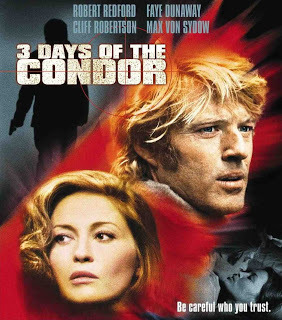
As someone who has pretty much given up on going to an actual movie theater to see a movie, I really love having Amazon Prime. There is rarely anything at Tinsel Town I want to see (most of the movies are geared toward the 18 to 35 year old male demographic), and if I do go, the sound is too loud--I've literally watched a movie with my fingers in my ears-- and people insist on talking (Huh. Maybe THAT'S why the sound is so loud.)
Anyway, I used to be a dedicated movie-goer. Started going when I was three just to see my beloved Roy Rogers. (sigh) But these days the aggravation cancels out any joy from the experience. So. Yesterday I cranked up the Prime and I re-watched THREE DAYS OF THE CONDOR (1975). Faye Dunaway and Robert Redford at their most beautiful. Loved her hair and makeup. His wind-blown look wasn't half bad, either.
I'd forgotten that the Christmas season was a subtle backdrop. There were no cell phones, of course, just Superman phone booths. Nurses were easily identifiable because they wore white uniforms AND caps, and some of it was filmed inside and around the World Trade Center. (Very sad to see that.) But the movie still held up. Why? Because of the then preposterous plot premise--which I had also forgotten--that some aspect of the US government wanted to invade the Middle East. Robert Redford's character, "Joe Turner," was shocked upon learning this. Me, this time around, not so much.
Published on September 02, 2013 07:16
August 22, 2013
Writing (About) Life--The Writer's Mushroom-y Nutty Backyard
This is the result of a stroll around the yard, camera in hand. The sun is actually shining. Haven't seen much of that lately.
So look what I found:
A chestnut, of Mel Torme's The Christmas Song fame. You don't want to step on one of these unless you have on really sturdy shoes. I have no idea how a roasted chestnut would taste. I've never eaten one. I know the actual chestnut is hard to get to because of the spines on the outer covering, and if you're going to roast any, you'd better pierce them with something sharp or you'll be sorry. I also know that Native Americans showed starving Early American settlers how to use them for food. (They've probably had second thoughts about that.) And that's about it--except the DH planted the tree over my objections. Chestnut trees smell terrible when they bloom.

A brown mushroom. Make that a very LARGE brown mushroom. This thing is nearly the size of a dinner plate.
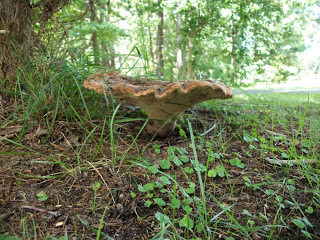
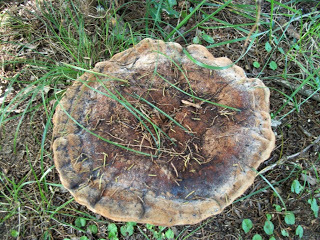
A double mushroom and a pecan. The squirrels have already started on the pecan tree, sampling to see if the pecans are ready and if they're not, throwing them down. This one is from the tree my late dad started from seed. It's always loaded, and the "load" disappears before we ever get any--mostly from all the "sampling."
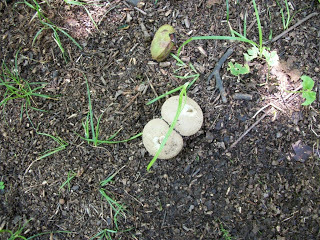
A green mushroom and an acorn with its cap still on.
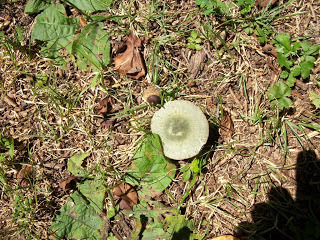
A red mushroom in a patch of sunlight.

You've heard of "bedroom eyes?" Well, these are "mushroom eyes." And on the high side of creepy. What are these things, anyway?
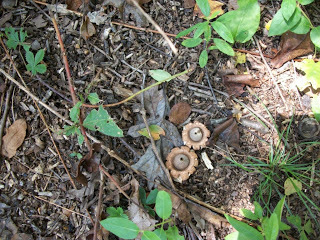
This concludes our tour of the Writer's Backyard."
'Til next time...
So look what I found:
A chestnut, of Mel Torme's The Christmas Song fame. You don't want to step on one of these unless you have on really sturdy shoes. I have no idea how a roasted chestnut would taste. I've never eaten one. I know the actual chestnut is hard to get to because of the spines on the outer covering, and if you're going to roast any, you'd better pierce them with something sharp or you'll be sorry. I also know that Native Americans showed starving Early American settlers how to use them for food. (They've probably had second thoughts about that.) And that's about it--except the DH planted the tree over my objections. Chestnut trees smell terrible when they bloom.

A brown mushroom. Make that a very LARGE brown mushroom. This thing is nearly the size of a dinner plate.


A double mushroom and a pecan. The squirrels have already started on the pecan tree, sampling to see if the pecans are ready and if they're not, throwing them down. This one is from the tree my late dad started from seed. It's always loaded, and the "load" disappears before we ever get any--mostly from all the "sampling."

A green mushroom and an acorn with its cap still on.

A red mushroom in a patch of sunlight.

You've heard of "bedroom eyes?" Well, these are "mushroom eyes." And on the high side of creepy. What are these things, anyway?

This concludes our tour of the Writer's Backyard."
'Til next time...
Published on August 22, 2013 11:51
Cheryl Reavis's Blog
- Cheryl Reavis's profile
- 37 followers
Cheryl Reavis isn't a Goodreads Author
(yet),
but they
do have a blog,
so here are some recent posts imported from
their feed.



